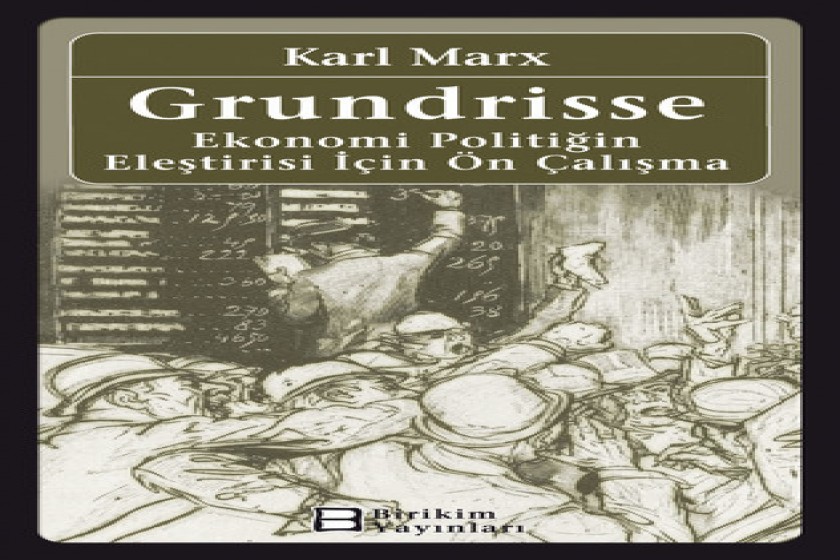
Reading Grundrisse
- 16 November, 2020
- লেখক: সৌমিত্র বসু
Reading Grundrisse: From the realm of Necessity to the realm of Freedom – The principal theme of Grundrisse establishes Marx as a social revolutionary separate from a theorist of Capital and Capitalism. Capital along with Money on one hand and Labour, Labour-power, Production, Distribution and Consumption, through the generation of Surplus Value mediated by the reproduction of Capital is just one big totality – a process, that shows up in different moments where one element dominates the others and then again moves over to the other moment where it gives itself away to the “other” in the next measurable moment – This is how Marxism is expounded and that is what we learn from Grundrisse.
Social Scientists and later Marxists or at least a vast majority of them took DAS CAPITAL as the bible of Marxism. The folly of synecdoche has led the Marxists of the world, especially those in the developed capitalist countries to neglect the leading revolutionary role of the peasantry and propound that the organized industrial proletariat is the prime leading class for a revolutionary change - the revolutions that changed the world manifold however never corroborates that hypothesis. From the realization of “Socialist revolutions cannot be triggered first in the most developed countries” and that “The Capitalist chain is only as strong as the weakest link” and therefore “revolutions could be and would be possible in backward capitalist countries or in the third world” made revolutionaries realize something that they never theorized for.
Marx had to weigh between choices that he experienced. On one hand he observed “Peasant war in Germany”, “First war of Independence in India”, Irish Question and the plunder in Colonies and hinted that revolution might not follow the drop-offs of capital only. The question of India and the vast study he painstakingly went through – the introduction of railways which he first lauded and later realized to be the biggest hoax – made him look for discourses separate from the “Capital track” of the west. Colonialism is a different animal and Capital is only one part of the story – is what Marx hinted and asserted very comprehensively and conclusively, that made Marx the revolutionary and the revolutionary theorist appropriate for the entire world – not the theory of Capital. The centrality of DAS CAPITAL in the Marxist theory is a track that led to the schism of Marxism of the first and the third world - a ‘thing’ not to be blamed on the specificity of the third world revolutionaries but definitely on the kind of west-centrism of the revolutionaries in the west. Marx realized that the liberation of the working class of the developed West presupposes [sort of] the liberation of the colonies with a different kind of production process came to be accepted and realized much late, leading to mammoth revolutionary movements in the entire world fruitless.
Liberation in the “backward capitalist countries” and third world came more through the preponderance (preeminence) of the question of dignity rather than the question of Capital. Needs or compulsion of the growth of Capital created Colonialism, followed subsequently by newer forms of colonialism, but the opposition and political rejection of Capitalism among the ‘natives’ [so to say] came through the question of DIGNITY - the craving of a social identity separate from the alien rulers. Hypothetically ideating that had the Western Colonialist countries would have had benign and benevolent form of governance in the colonies - revolutions and liberation struggles might not have exploded - is too much of a dream sequence not corroborated with the world history anywhere. Marx showed that compulsions of Capital growth is the guiding fact in territorial expansion along with the fact that natives developed a collective identity to fight against this aggression and expression and could easily find support among all the classes within a colony. The famous final cognizance and acceding of Marx that expansion of railways in India did not bring any good to the “Hindus” [he meant inhabitants of Hindustan], corroborates this fact. Grundrisse at the later chapters clearly expounded that people has many reasons and rational other than the mere daily necessities, to react and that insight was corroborated by the later liberation movements led by the Marxists on ground to most successfully integrate liberation movements under Marxist revolutionary movements. Grundrisse thus founded Marx on a strong ground as the leading theory of revolution, than the reading and study of CAPITAL. Which is written earlier and which later is a lame consideration in this discourse.
Freedom, as Marx indicated is not a “primordial” or romantic un-historic base, as it is posed by the liberals. Had it been that way the expressions of achieving that would have come out as expressions of individualistic rebellions of people separate from each other. Marx started showing that production, consumption and recreation all are social necessities and are only realizable and measurable in social perspective and through social process. This Process driven and Social-relation driven attitude or bent of mind led him to think every political activity including the ‘personal’ is social and is governed and limited through social necessities. Thus to Marx, freedom is only realizable as a social phenomenon and can only be achieved through the breaking of shackles of “necessity”. A more focused attention would reveal that in his famous first line [as mentioned here], he talked about the “realm” or space of necessity of all kinds social and personal as well. One can thus only comprehend, strive for and realize Freedom by coming out forcefully from the realm of necessity, no other way out! To Marx, individual Freedom carries no sense, it is social or nothing because the question of necessity is a Production dictated and Production imposed factor on individual and social lives and living. Plainly, one can never achieve or realize any form of freedom or liberty by being forced into the realm of unfulfilled necessity as that realm is forced upon one socially through social relations of material production.
Material production is the first start point therefore in defining the realm of necessity. Humankind needs material production and incessant production of materials to fulfill the necessities of daily life and living. This production is only ‘produced’ when everyone works more than one individually needs and thus fulfills others’ needs – that, a social act indeed! Freedom is not independent or orthogonal to material needs and did not come about dropped from heaven as a birth endowment. It is right that needs to be realized through incessant socially necessary labour and striving for the collective and social ownership. Alienation of this ownership is the cause-primer of social exploitation. Thus generation of surplus value is the only method of social living or the need for incessant generation of social labour-power is the only haemoglobin that circulates in the social body politic, but the ownership of that labour-power is the point-of departure and the question of social considerations. If and when Capital takes ‘buys off’ the labour-power of labourers, it alienates the generators of the labour-power from her own production as it does not serve her anymore. Alienation is not biting nor is ‘painfully realized’ when it is generated for the society where the generator realizes benefits from it through social interaction and gains social help and benefits. Wage however does not fall in this category (benefit), as it is a kind of advance from the expropriator to ensure the regeneration of labour power. Every time wage is ‘advanced’, the act pushes down the labourer deeper into the vortex of un-freedom. The money, even if some part of it is saved does not help the labourer to come up the ‘development’ stairs toward achieving freedom. Thus wage, however more compared to other labourers is no tool to achieve freedom. This is the philosophical basis of grand unity of all kinds of producers who provide labour power to change the Nature toward development of society and human kind. Thus instead of ‘advancing’ Capital by the capitalist to the labourer, it is actually the ‘advancing’ of labour power to the Capitalist by the labourer that runs the world.- and that is the point of separation of Marxism and Liberalism.
Capitalist is the owner of means of production only when he owns the ‘assurance’ of labour-power , that means when he owns the ‘market’ , so to say, where the labourer is goaded to sell off her labour-power, that makes a labourer somewhat bonded in the system even when in all appearance she is ‘free’ to sell off her labour power to anyone. She is ‘free’ to sell off her labour power to individual Capitalist but verily bounded by the market and process of selling, by the system – that is why she is under the realm of necessity, wherefrom she has to break off in the realm of freedom – that is the definition of social revolution.
Marx mentions the question of technology and the point where he apprehends that humans may be removed by machines [replacing one means of production by the other], but he did not see the limitation of this ‘eating away’ phenomenon. Robots even through ‘deep learning’, may replace only (1) the repetitive work, (2) process driven or algorithmic work (3) comparing and rule bound decision making work. It cannot replace the ‘basic irrationality’ of human beings, that actually engenders creativity and innovation, which comes only through sudden brainwaves. Human civilization would try on to predict irrationalities through pattern matching and probabilistic measures, and that can be remodeled by machines after many years of “training” and ‘learning’, but moments of revolutionary changes come from those rare creative brainwaves that could not be predicted - this increases the VALUE of human labour and human labour-power as something that cannot be replaced by any predictive algebra. Humans therefore would always lead the society and not Capital producing Robots. This HUMAN has DESIRES, that need fulfillment, this can be engendered only through increasing social relations – there comes the question of social being, that of knowledge and experience sharing. This is the grand narrative – the ever increasing side of it that changes, expands, creates and remodels the principal means of production – the Humans. Any revolution therefore addresses the question of social being and social development of individuals Every revolution thus is necessarily social or otherwise it is not a revolution.
The salience of basic irrationality and the impossibility of predicting that put Humans and their Dignity in the centre stage of Human Development. Freedom thus is not individual, it is social and socially determined. The journey of moving out of the realm of necessity [some might say ‘Karma’ and ‘Karmic cycle’] can not be achieved through individual asceticism of attaining ‘Nirvana’, it can only be achieved through social and political revolutions – Nirvana is not individual, it is social! That is the uniqueness of knowledge through Grundrisse. Individual Human beings can only move from the ‘realm of necessity to the realm of freedom’ through social revolutions and no act of individual strife.
